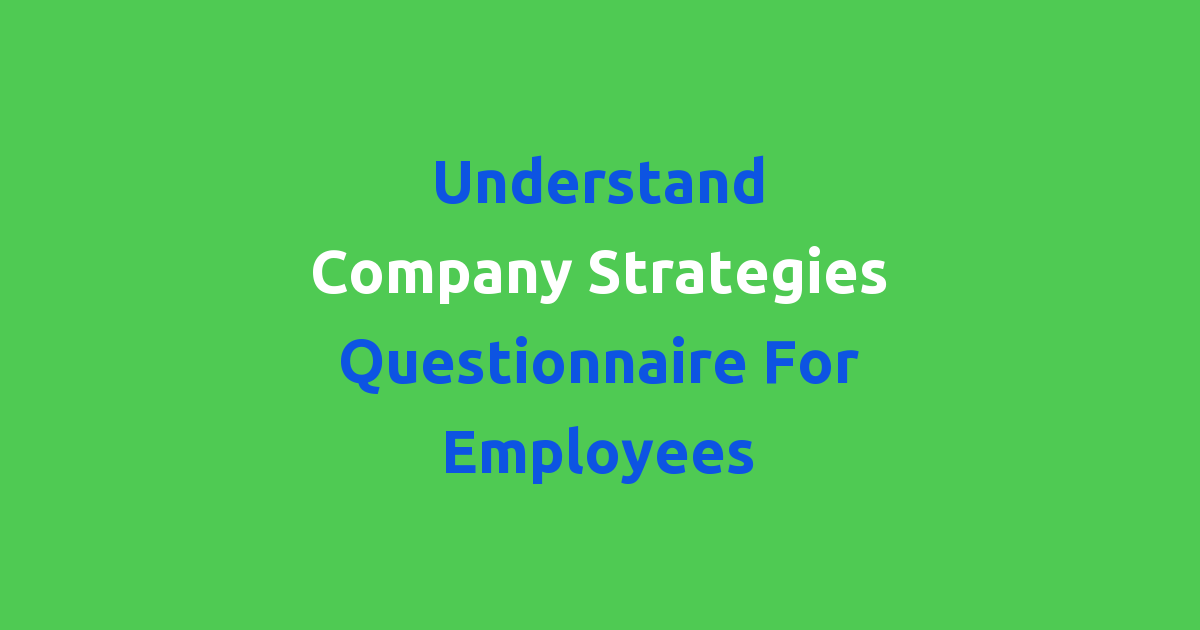Questionnaire for employees to understand company strategies.
Understanding Company Strategies Questionnaire for Employees
Introduction
In today’s competitive business environment, it is essential for companies to understand the needs and expectations of their employees to develop effective strategies that promote employee satisfaction and improve overall performance. One way to gather such valuable insights is through the use of questionnaires designed specifically for employees. These questionnaires can help organizations identify areas of improvement, gauge employee engagement, and align company goals with individual aspirations.
Problem Statement
The problem with many companies is that they often lack a systematic approach to collecting feedback from their employees. This leads to a disconnect between management and employees, resulting in lower job satisfaction, higher turnover rates, and decreased productivity. Without a proper understanding of employee needs and preferences, companies may struggle to retain top talent and achieve their business objectives.
Existing System
Currently, many companies rely on outdated methods such as annual performance reviews or sporadic feedback sessions to gauge employee satisfaction. These methods are often biased, inconsistent, and fail to provide a comprehensive picture of the workforce’s sentiments. As a result, companies may miss out on valuable insights that could drive meaningful change and improve organizational culture.
Disadvantages
The disadvantages of the existing system include limited feedback opportunities, lack of anonymity, and the inability to track changes over time. Employees may feel hesitant to express their true opinions, fearing backlash or repercussions from management. This lack of transparency can hinder communication and collaboration within the organization, leading to lower morale and higher turnover rates.
Proposed System
To address these shortcomings, a new questionnaire system can be implemented to gather feedback from employees in a more structured and consistent manner. The questionnaire can be designed to cover a wide range of topics such as job satisfaction, work-life balance, career development, and communication channels. By utilizing a digital platform, employees can provide feedback anonymously, ensuring honest responses and fostering trust within the organization.
Advantages
The proposed system offers several advantages over the existing methods of gathering employee feedback. These include increased transparency, improved data accuracy, and real-time tracking of employee sentiment. By leveraging advanced analytics tools, companies can gain actionable insights from the data collected, enabling them to make informed decisions and drive positive change within the organization.
Features
Some key features of the new questionnaire system include:
– Anonymity: Employees can provide feedback without fear of retribution, enabling them to express their true opinions honestly.
– Customization: Questionnaires can be tailored to specific departments or job roles, ensuring relevance and accuracy of feedback.
– Real-time reporting: Data can be analyzed instantly, allowing for quick identification of trends and areas of improvement.
– Action planning: Insights from the questionnaire can be used to develop actionable strategies that address employee concerns and enhance job satisfaction.
Conclusion
In conclusion, understanding company strategies through employee questionnaires is crucial for fostering a positive work environment, enhancing employee engagement, and driving business success. By implementing a comprehensive and user-friendly questionnaire system, companies can gain valuable insights into employee needs and preferences, leading to improved job satisfaction, higher retention rates, and increased productivity. It is essential for organizations to prioritize employee feedback and take proactive steps to address any issues or concerns raised through the questionnaire process. By creating a culture of open communication and continuous improvement, companies can build a strong foundation for long-term success and sustainable growth in the ever-evolving business landscape.

